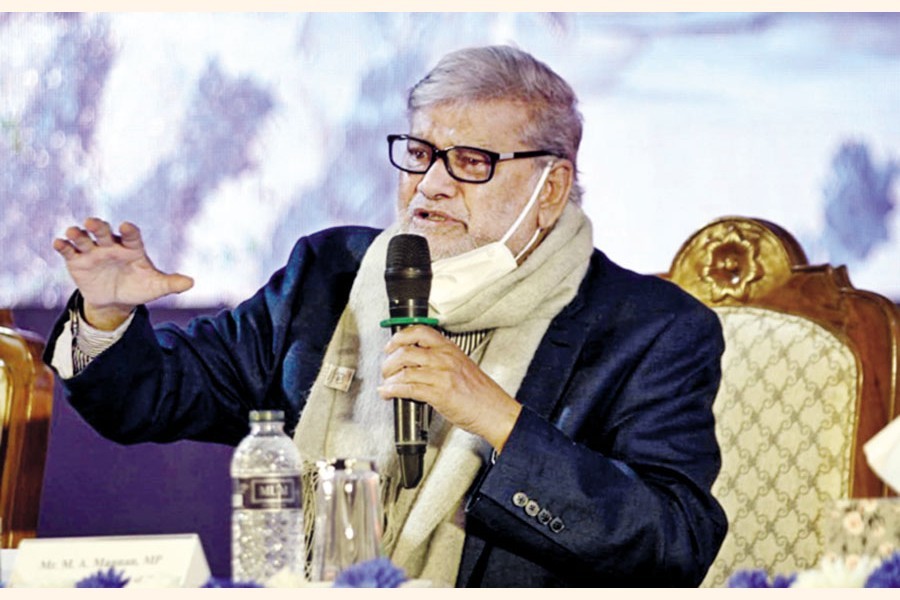Planning minister MA Mannan has suggested that the central bank enquire about the reasons behind some banks' reluctance to disburse Covid-19 stimulus packages.
He is unhappy over the poor execution of some packages, especially for CMSME (cottage, micro, small and medium enterprise) sector badly hit by the pandemic.
All banks are legally bound to follow the instructions of Bangladesh Bank (BB), the regulator for financial institutions, but some delivered poorly, he said.
"A good portion of the fund (stimulus packages) didn't go to the bottom of the SME sector. The BB should go deep and enquire why some banks didn't listen to them…"
Mr Mannan was speaking as the chief guest during the second episode of the dialogue series organised by the finance ministry on Thursday.
Based on the findings of the enquiry, he suggested, the regulator should reshape or reformulate the policies, if necessary.
The minister said the economy started rebounding, thanks to the government's quick response to the socio-economic disaster caused by the highly transmittable virus.
Terming mistargeting of the beneficiaries another key challenge, he said the economy does not get the expected level of return because of inclusive and exclusive errors in the selection system.
The second part of the series styled 'Employment creation and revitalising rural economy' was held at Osmani Auditorium in Dhaka chaired by finance division senior secretary Abdur Rouf Talukder.
At the event, BB governor Fazle Kabir said there is a Tk 200-billion stimulus package for CMSME sector and 41.08 per cent has so far been deposited to 61,913 beneficiaries.
He said they have scrutinised slow implementation of the package. Based on that, the BB introduced a credit guarantee scheme of Tk 20 billion for CMS (cottage, micro, and small) enterprises that need not collateral to get funds.
Mr Kabir said they have a plan to enhance the fund up to Tk 50 billion in the coming days to help cover slow progress.
On the refinancing scheme of Tk 30 billion for low-income professional farmers and small businessmen, he said the slowest disbursement is observed in this package as only 32 per cent has so far been released.
"We took various steps to speed up implementation. We hope we'll be able to disburse 90 per cent of the fund by this December," Mr Kabir mentioned.
Distinguished fellow at Centre for Policy Dialogue Dr Mustafizur Rahman said policymakers should learn from Covid-19 pandemic and develop strategies with a job-centric approach in rural areas.
Bangladesh has 61-million people in the labour force and 70 per cent or 43 million are in rural areas.
Of the total rural employment, 23 million are engaged in agriculture that constitute 40 per cent of the country's overall labour force.
"And 40 per cent of the labour force is creating 30 per cent of the GDP (gross domestic product). That's why, we should really focus on labour productivity in agriculture."
Mr Rahman said the world has been talking about a triangular crisis because of coronavirus-economic crisis, health crisis and food crisis. But Bangladesh did not face any food crisis.
In fact, rural economy saves Bangladesh, he uttered. "We need such development strategies that would enhance productivity and create good jobs in rural areas."
Mr Rahman suggested connecting rural economy with urban economy through forward and backward linkages for sustainable economic outcomes.
Planning Commission member (senior secretary) Dr Shamsul Alam highlighted the importance of further increasing the tax-GDP ratio and job creation to cope with the challenges lying ahead.
He was also focusing on rationalisation of the existing tariff structure that will help boost exports. While presenting a keynote, Mr Talukder said the government has so far announced 21 stimulus packages amounting to Tk 1.21 trillion, which is 4.34 per cent of the GDP.
About signs of economic recovery, he said economy has already experienced sharp growth in key macroeconomic indicators like export, remittance, forex reserve, revenue collection and private sector credit growth.
This growth has been made in the first four months of the current fiscal year compared to that in the previous fiscal.
"Available data is indicating that the country is rebounding strongly, which is a good thing for us," Mr Talukder added.
ADB country director Manmohan Parkash, FBCCI president Sheikh Fazle Fahim and SME Foundation chairperson Dr Md Masudur Rahman also spoke.


